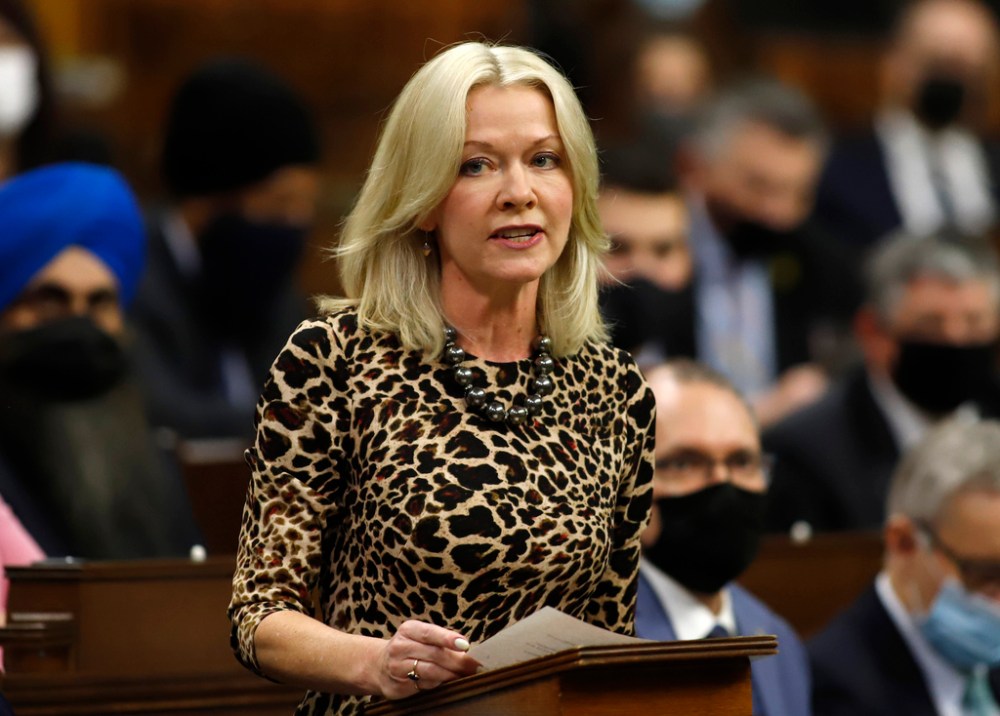Manitoba Tories take issue with Bergen’s carbon-tax pivot
Advertisement
Read this article for free:
or
Already have an account? Log in here »
To continue reading, please subscribe:
Monthly Digital Subscription
$19 $0 for the first 4 weeks*
- Enjoy unlimited reading on winnipegfreepress.com
- Read the E-Edition, our digital replica newspaper
- Access News Break, our award-winning app
- Play interactive puzzles
*No charge for four weeks then billed as $19 plus GST every four weeks. Offer only available to new and qualified returning subscribers. Cancel any time.
Read unlimited articles for free today:
or
Already have an account? Log in here »
Hey there, time traveller!
This article was published 10/02/2022 (1050 days ago), so information in it may no longer be current.
OTTAWA — Interim Conservative party leader Candice Bergen is reversing her party’s embrace of a carbon tax, but some fellow Manitobans would rather the Tories stay the course.
As first reported by the Toronto Star, Bergen told her caucus Wednesday that MPs will go back to attacking the concept of federally imposed carbon levies until the party elects a new leader who can set their own policy.
The Portage—Lisgar MP replaced Erin O’Toole last week after he was removed by the Tory caucus due to a series of grievances, including a convoluted carbon-pricing plan he pitched during the 2021 election campaign to the dismay of many Conservatives from the Prairies sitting in the Commons.

That means the party will now be able to go on the offensive April 1, when the Trudeau government’s carbon tax gets another incremental increase.
Bergen’s decision did not impress David McLaughlin, a longtime Tory who helped craft Manitoba’s original carbon-pricing plan.
“They’re caught in a decade-long contradiction on climate change that continues to bedevil them,” McLaughlin said of the federal Conservatives.
The caucus includes many MPs who represent rural ridings, but McLaughlin said the party needs to focus on regions where they’re not winning seats.
“They can demand ideological purity, and fidelity to a no-carbon-tax-ever position. But if they don’t have a credible alternative to deal with climate change, they’re simply going to leave votes on the table that they should be able to get.”
McLaughlin noted that carbon taxes are generally a conservative approach to disincentivizing emissions, since they put the burden on those who use fossil fuels, instead of a socialized scheme that spreads the cost across all of society.
He also argued it was inappropriate of Bergen to be prescribing any party change when her role is to be a caretaker.
“It’s direct, it’s intentional and it’s heavy-handed,” he said. “It’s setting out policy before leadership candidates and the party have a chance to reflect on that, which is what a leadership race should be about.”
McLaughlin led Manitoba’s public service on behalf of former premier Brian Pallister, who tabled his own carbon-tax plan and then sued Ottawa for imposing a more costly one, which he argued didn’t recognize carbon saved through decades of Manitoba Hydro investments.
Premier Heather Stefanson has scrapped the court challenge, pledging to design her own plan that would take effect in 2023.
On Thursday, her government said it wouldn’t follow Bergen, instead focusing on working with Ottawa to help meet Canada’s pledges under the Glasgow Climate Pact.
Prominent Tories in the national party formed a group Thursday to lobby leadership contestants to get serious about climate change.

The nascent group, Conservatives for Clean Growth, includes former Ontario MP Lisa Raitt and strategist Ken Boessenkool.
They argue the Tories can win more ridings only if they have a credible, coherent environmental platform instead of a constantly shifting set of proposals.
“What the party needs is to take a really hard look at its climate-change policy,” said Andrew Enns, a Winnipeg pollster who is part of the upstart group.
He noted that the Conservative movement was, in recent decades, at the vanguard of addressing environmental issuessuch as acid rain, ozone depletion and wetland loss.
“It failed to keep with some of the changing evolution,” he said, arguing there are a range of policies that could help Canada’s job market keep up the pace with global companies pledging zero-emission targets.
Enns didn’t have a take on Bergen’s decision to scrap support for carbon pricing. But he noted that the surveys he conducts as a vice-president at Leger show that Canadians already feel living costs are too high.
“That’s going to be a consideration,” he said. “But that doesn’t take the party off the hook from having a strong, credible climate policy.”
dylan.robertson@freepress.mb.ca


